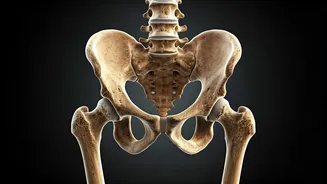Importance of Bone Health
Bone health is frequently overlooked, yet it's essential for overall well-being. As people age, the risk of osteoporosis and fractures increases, impacting
mobility and quality of life. This is particularly true for individuals over 60. Maintaining bone strength involves a proactive approach that includes proper nutrition, regular exercise, and healthy habits. By taking these measures, seniors can reduce the chances of falls and fractures. Strong bones allow continued independence and participation in activities one enjoys, allowing for greater peace of mind and more vibrant living.
Weight-Bearing Exercises
Weight-bearing exercises are a cornerstone of bone health, prompting bones to remodel and become denser. These exercises put gentle stress on the bones, stimulating them to build up strength. Activities such as brisk walking, jogging, dancing, and climbing stairs are particularly beneficial. Engaging in these exercises at least three times a week can significantly improve bone density. It's crucial to begin slowly and gradually increase intensity. Consulting with a healthcare professional before starting any new exercise routine is recommended, especially for individuals with pre-existing health conditions. Consistency is key, and making these exercises a part of the regular routine will provide long-term benefits and reduce the risk of fractures.
Strength Training Benefits
Strength training, also known as resistance training, offers significant benefits for bone health. Lifting weights or using resistance bands works muscles, pulling on the bones, and signaling them to strengthen. This type of exercise targets various muscle groups and improves overall body strength. It is particularly effective for those over 60, as it helps to combat age-related muscle loss (sarcopenia), which can indirectly protect bones. Aim to incorporate strength training sessions at least twice a week, focusing on major muscle groups. Start with lighter weights and higher repetitions and gradually increase the weight as strength improves. It's important to use proper form to avoid injury. Strength training not only improves bone density but also enhances balance and reduces the risk of falls.
Calcium and Vitamin D
Adequate intake of calcium and Vitamin D is fundamental to maintaining bone health. Calcium is the primary building block of bones, providing the structural support. Vitamin D enhances calcium absorption, ensuring that the body can use calcium effectively. Dietary sources of calcium include dairy products, leafy green vegetables, and fortified foods. Supplementation may be necessary, especially for those with lactose intolerance or other dietary restrictions. Vitamin D can be obtained from sunlight exposure, but in many regions, especially in the winter, supplementation becomes necessary. Regular blood tests can determine Vitamin D levels. Consult with a healthcare provider to determine the appropriate dosage to maintain optimal levels. Combining both calcium and Vitamin D ensures stronger bones and overall improved health, especially as you get older.
Dietary Considerations
A balanced diet plays a pivotal role in maintaining strong bones. Besides calcium and Vitamin D, other nutrients like magnesium, phosphorus, and vitamin K are essential. Include a variety of nutrient-rich foods in your diet, such as fruits, vegetables, lean proteins, and whole grains. Minimize the consumption of processed foods, excessive sodium, and caffeine, as these can negatively impact bone health. Staying hydrated is also essential because it helps the body absorb nutrients. Pay attention to protein intake, since it supports muscle mass and bone health. Prioritize a diet that is rich in nutrients and low in processed sugars and unhealthy fats to ensure optimal bone health. A well-rounded diet supports overall well-being and aids in maintaining a healthy lifestyle, contributing to better long-term bone density.
Lifestyle Adaptations
Certain lifestyle choices can significantly influence bone health. Smoking and excessive alcohol consumption are detrimental, increasing the risk of osteoporosis and fractures. Quitting smoking and moderating alcohol intake can benefit bone health significantly. Regular exercise, as discussed earlier, is crucial. Additionally, maintaining a healthy weight is essential, as being underweight can also weaken bones. Create a safe environment in your home to prevent falls, such as removing tripping hazards and ensuring adequate lighting. Regular health check-ups and bone density screenings, as advised by a healthcare professional, are also recommended. Focusing on lifestyle adjustments will contribute significantly to maintaining bone strength and improving the overall quality of life.
Medications and Supplements
Certain medications and supplements can support bone health. Your healthcare provider may recommend medications to treat or prevent osteoporosis if you are at higher risk. These might include bisphosphonates or other drugs, but it's important to discuss the potential benefits and risks. Additionally, calcium and vitamin D supplements might be necessary if dietary intake is insufficient. Other supplements, such as vitamin K or magnesium, may also be beneficial. Always consult a healthcare professional before starting any new supplements. They can assess your individual needs and recommend the appropriate dosages. Adhering to the prescribed medication regimen and taking supplements as directed is critical to maximizing benefits and maintaining optimal bone health.













